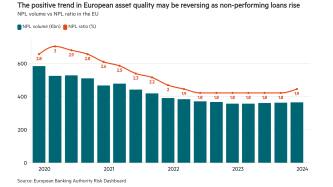On May 28, 2024, the US — the world’s largest securities market— will move to settle trades faster than the UK and Europe. There is a growing sense of urgency as the date moves closer.
How Europe and the UK should respond was the big theme on the first day (October 17) of the operations, post-trade, technology and innovation conference hosted by the Association for Financial Markets in Europe (AFME).
Delegates heard from regulators, brokers and clearing houses about the potential opportunities and dangers for capital markets this side of the Atlantic.
Jennifer Robertson, head of unit, financial market infrastructure at the European Commission (EC), gave insight into the strategic view from Brussels, saying: “We are moving to a shorter settlement cycle. The question is not if — but when — it will happen in Europe.
“Settlement cycles on the continent need to be improved, but a faster settlement cycle could create problems for executing trades,” she continued. “Technical innovation is the key to enable successful post-trade settlements in faster capital markets. There is nothing to stop you from moving to T+1 tomorrow if you want, but it will require investment.”
Laying the groundwork
The European Securities and Markets Authority (Esma) is working hard to figure out options for the roll-out of any new system. It launched a consultation about shortening the settlement cycle on October 5. The deadline for responses is December 15 and Esma will consider in the first quarter of 2024.
Esma intends to submit evidence to the EC and publish a final report in the fourth quarter of 2024 at the latest.
Verena Ross, chair of Esma, spoke about the fundamental questions that T+1 consultation seeks to address: “We need to recognise that the move to T+1 in other jurisdictions will affect EU markets. The aim of this work is to see if the settlement period should be shortened and when.
“There are two points that need to be kept in mind: EU markets securities trading must be stable and transversal. Yet, the capital markets must also remain competitive and efficient.”
Different assessments
The exact details of how a new regime should be handled were left to a panel whose members expressed a variety of perspectives.
Matt Johnson, director at the Depository Trust & Clearing Corporation, welcomed T+1. “Shortening the settlement cycle is a good idea. If you look at things from a risk and settlement perspective, the longer a trade is open the more vulnerable it is to the credit cycle and volatility,” he said.
Mr Johnson went on to say that any move to T+1 creates the opportunity for modernisation and could spur Europe and the UK to reimagine their capital markets architecture.
Other panellists were sceptical and questioned if there really is a problem with the settlement systems in Europe. Jesús Benito, head of domestic custody and trading operations at Swiss exchange services provider SIX, said he has not heard of settlement challenges from retail clients.
He also argued it is important to make legitimate comparisons between different markets, and asked: “What are the figures from the other markets and how can we make a fair comparison?”
Mr Benito noted that there is a risk of being too pessimistic about Europe and failing to project an image of confidence. “If we talk about settlement efficiency problems and there is not a big problem with settlements, we may give the impression to the outside world that there is,” he added.
He also said that T+1 is difficult to implement in Europe with the current hardware, but developments in distributed ledger technology (DLT) could be a gamechanger. Mr Benito estimated DLT could be running within the next five to 10 years, and that would consign conversations about T+1 to history.
When exactly to move to T+1 in Europe was a thornier issue, with 2026 to 2028 being mentioned on several occasions. But shorter-term problems must first be addressed, such as how the settlement of foreign exchange (FX) trades will be handled from the first day of T+1 in the US.
Lisa Danino-Lewis, chief growth officer for financial market infrastructure firm CLS Group, said that her clients are on the phone to her about nothing else. She pointed out that CLS processes $6.5tn a day in FX business and that problems would be most acute towards the close of US markets. This is when the market is most illiquid and that makes it harder to settle FX orders.
“The end investor is not happy about it [T+1] from an FX perspective. If you are going to pre-fund trades, that adds cost, while if you settle outside trade times, that adds cost and risk,” she said.
Goldman Sachs executive director Sachin Mohindra also sat on the panel and observed that T+1 should not be the priority for Europe but settlement efficiency should be. He added that rather than complain about what is happening on the continent, people here should look at what is happening in the US. “One positive aspect [of the move to T+1 in the US] is that the conversation put the settlement cycle into the spotlight,” he said.
Mr Mohindra mentioned the FX component is a challenge with different time zones, but the US Securities and Exchange Commission is “aware of all this”. “Misalignment of global securities like [exchange-traded funds] are being looked at, and hopefully dealers will provide liquidity,” he continued.
Still, he warned that Europe cannot afford to be left behind, and said it is “sad to see Europe as a follower rather than leader” on the settlement cycle.













